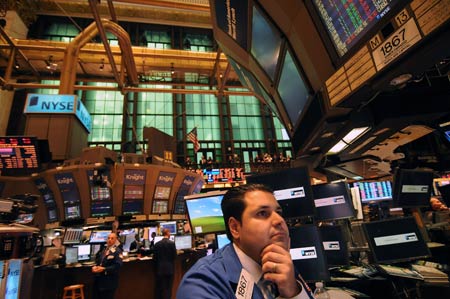Money
Markets decline on the back of US plunge
Updated: 2011-08-20 07:52
By Zhang Shidong (China Daily)
|
|
SHANGHAI - Stocks on the Chinese mainland fell on Friday, capping a fifth week of losses for the benchmark index.
The retreat followed a plunge by equities in the United States on concern the global economic slowdown is deepening and as analysts speculated that China's central bank may raise interest rates.
"There will be a knee-jerk reaction to the global rout, prompting some panic selling," said Zhang Ling, general manager at Shanghai River Fund Management Co. "On the other hand, that may force China to change its growth model to domestic consumption from exports, but that'll be a long and painful process."
The Shanghai Composite Index, which tracks the bigger of China's stock exchanges, dropped 25.11 points, or 1 percent, to 2534.36 at the 3 pm close. It fell 2.3 percent this week, extending the longest streak of weekly losses since December 2010, on concern a slowing economy will dampen corporate earnings. The CSI 300 Index slid 0.9 percent to 2807.66.
The Shanghai gauge has fallen 9.7 percent this year as the People's Bank of China (PBOC) raised interest rates five times and ordered lenders to set aside more cash as deposit reserves 12 times since the start of 2010 to contain inflation that quickened to the fastest pace in three years last month. The measure is valued at 11.6 times estimated earnings, the lowest since Bloomberg began to track the data in 2006, according to weekly data compiled by Bloomberg.
The rising yields of bills sold by China's central bank this week may indicate that the monetary authorities will maintain a tight policy stance and closely watch future inflation trends before raising interest rates, the China Securities Journal reported on Friday, citing unidentified analysts.
One-year bill yields were higher than the one-year deposit rate for three months before the PBOC raised interest rates in July, according to the newspaper, operated by the official Xinhua News Agency.
The central bank may announce an increase in interest rates over the next few weeks, Daiwa Capital Markets Hong Kong Ltd said in a report on Friday. Increases in one-year bill yields have proven a good leading indicator of interest-rate increases in China, Hong Kong-based economists Sun Mingchun, Kevin Lai and Fei Xue wrote in the report. Since 2007, the central bank has always raised rates when the one-year yield exceeds the one-year deposit rate, the economists wrote.
Asian stock markets slid on Friday with benchmark indexes in Japan and South Korea falling at least 2 percent. The Standard & Poor's 500 Index slumped 4.5 percent on Thursday after a report showed that the Federal Reserve Bank of Philadelphia's general economic index plunged to minus 30.7 this month, the lowest since March 2009. Another report showed that more US residents than forecast filed applications for unemployment benefits last week, while the National Association of Realtors said that sales of previously owned homes in the US unexpectedly dropped in July.
Crude oil for September delivery plunged 5.9 percent to settle at $82.38 a barrel in New York on Thursday. The London Metal Exchange Index of prices for six industrial metals including copper and aluminum retreated 2.4 percent. Gold futures rose 1.6 percent to a record in New York.
China's stocks may rebound as the slowing global economy will spur the government to ease its policy-tightening stance, according to Industrial Securities Co.
The current situation isn't a "falling-over-the-cliff" economic crisis like in 2008, Li Yanlin, an analyst at the brokerage, wrote in a report on Friday. Signs of "targeted loosening" are emerging as China's State Council has already approved the expansion of a pilot program for credit asset securitization for small companies, according to the report.
Investors should prepare for a stock rebound as Federal Reserve Chairman Ben Bernanke may announce "big policy moves" at a conference at Jackson Hole, Wyoming, on Aug 26, including US bond purchases of more than $600 billion and a job-stimulus program, according to Societe Generale SA.
Citing the effect on markets from the so-called Q2 bond-buying plan, Todd Martin, Asia equity strategist at the French bank, said that investors should buy "cheap" growth stocks in China, India and South Korea along with "defensive, high-yielding" equities, according to a note to clients.
Bloomberg News

Specials

Biden Visits China
US Vice-President Joe Biden visits China August 17-22.

Star journalist leaves legacy
Li Xing, China Daily's assistant editor-in-chief and veteran columnist, died of a cerebral hemorrhage on Aug 7 in Washington DC, US.

Hot pots
Tea-making treasures catch the fancy of connoisseurs as record prices brew up interest
